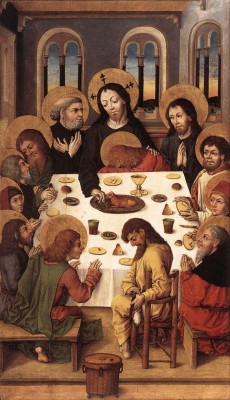Scripture: Lectionary 55. Fifth Sunday after Easter, April 28. Acts 14:21-27. Psalm 145:8-9.10-11.12-13. Revelation 21:1-5. John 13:31-33.34-35:
With springtime finally arriving and thriving we all have some experience of newness and freshness. This is characteristic of the Easter Season in the liturgy and the Eucharist since the greatest of events—the Resurrection of Jesus is central to the Paschal Mysteries. During this part of the season it is the glorious dimension of Jesus that is emphasized. The newness of the Scriptures and the Eucharist help us to be filled with joy, hope, and love.
The word for new that is used by Jesus in John’s Gospel goes beyond our ordinary understanding of that word. It is used with the word commandment and love. Jesus tells us, “I give you a new commandment: Love one another.” New in the language of the New Testament is pronounced KAINE (feminine since it modifies the word commandment which is feminine). This beautiful fresh springtime word in Greek has the sense of something not experienced before. It can mean something marvelous and remarkable and unheard of. This certainly fits its use in the context of the type of love that Jesus is commanding us to have. Agape (love) is all inclusive, non-controlling or possessive, totally committed, and ever faithful. Within our short passage from John it is used four times within verses 34 and 35.
There is a tradition behind the apostle John that he used to repeat this expression of love so often that people became a little upset. “Why do you say the same thing all the time?” He, of course, was referring to the special meaning that Jesus attached to it and in which it has such a depth of meaning that it was a prayer to repeat as often as possible. This same emphasis on a new commandment of love occurs in the First Letter of John as well as in the Gospel of John in the second part called the Book of Glory (chapters 13-21). Moreover, Jesus himself is described with the word love and the word new. In Ephesians Jesus is the new man. And John tells us that God is Love (Jesus is love, the Spirit is love).
Three of our readings speak of the new in the sense mentioned above. In our first reading the first missionary of Paul and Barnabas is a new apostolic journey that takes in nine different geographic areas or cities where the two apostles proclaimed the Resurrection of Jesus. It started at Antioch in Pisidia and returns to another Antioch in Syria not far from the coast and from Paul’s own city of Tarsus. Some scripture experts speak of the geography of the Gospels as a fifth Gospel; we may say the same of the areas that are covered by Paul in the Acts of the Apostles. Luke seems to have a better knowledge of the Mediterranean areas than those of Jerusalem and the Land of Israel, the Holy Land. Here to the surprise of many the Fourth Evangelist has better knowledge of the geography of the lands where Jesus walked. Thus this first journey of Paul and Barnabas is a new event in the early Church and its rapid growth among the Gentiles (the Nations).
In the Book of Revelation we have another beautiful surprise where the Church is compared to the striking fresh beauty of a bride and of a new Jerusalem descending from above and giving us a new earth and a new heaven! It does not get any better than that! God dwells among us as a people covenanted in a new kind of love that goes beyond family, friends, and neighbors to all whom we meet—including our enemies.
Jesus’ commandment of love surpasses all forms of love. Hence the word new gives it a deeper and refreshing unheard of meaning. The commandment is entirely positive without any shadow of a doubt. The saints are the ones who can help us understand what this love means—just think of the great women saints named Theresa.
Without stretching the emphasis of the word new, there seems to be a direct connection to the prayer of the Psalm used in today’s liturgy which expresses the love of God through covenantal language: “The Lord is gracious and merciful, slow to anger and of great kindness. The Lord is good to all and compassionate toward all his works.” The words used to characterize God are bound up with the Agape love that Jesus is speaking about in the new commandment given to us, “Love one another.” Easter is all about this new commandment of love. It is now up to us to practice it and to experience it in Jesus our Lord. Amen.
Copyright 2013 Fr. Bertrand Buby, S.M.
About the Author

Guest
We welcome guest contributors who graciously volunteer their writing for our readers. Please support our guest writers by visiting their sites, purchasing their work, and leaving comments to thank them for sharing their gifts here on CatholicMom.com. To inquire about serving as a guest contributor, contact editor@CatholicMom.com.



.png?width=1806&height=731&name=CatholicMom_hcfm_logo1_pos_871c_2728c%20(002).png)
Comments